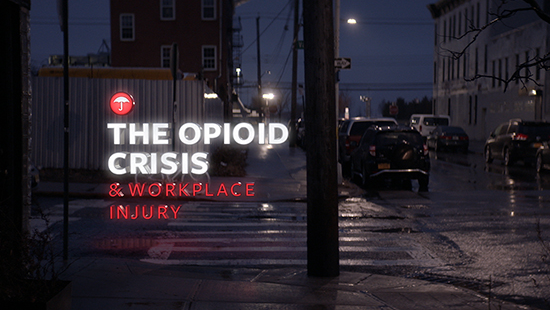Avoiding Opioid Addiction in the Construction Industry


At construction sites across the country, it’s not uncommon for the repetitive physical nature of the work, such as pouring concrete and lifting heavy equipment, to lead to injuries. When those injuries take employees off the job and to urgent care for help, it can be a critical moment for them and their families.
That’s because many construction workers who suffer from work-related injuries could be just one prescription away from an opioid addiction. According to the Centers for Disease Control and Prevention, the chances of chronic opioid use begin to increase after the third day supplied and rise rapidly after that.1 The risks are very real, and are affecting entire communities.
“The opioid epidemic is having a profound impact on our society, and the crisis is especially concerning for the construction industry, where the work can be repetitive and physically demanding,” said Rick Keegan, Chief Underwriting Officer at Travelers. Yet while the opioid epidemic makes headlines for claiming 130 lives a day in the U.S.,2 chronic pain, the origin point of many opioid prescriptions, receives far less attention.
Construction sites may contain many health and safety risks that can increase the likelihood of common workplace injuries and illness such as sprains, strains and fractures.3 All of those can lead to chronic pain, a condition that is often treated with highly addictive opioids. According to Travelers data, roughly half of all workers compensation claims related to the construction industry in recent years involve opioid prescriptions.4
Recognizing that pattern helped inspire Travelers to take action and help construction workers learn how to avoid developing chronic pain.
Data and innovation can help reduce addiction
“Travelers has helped reduce opioid abuse by almost 40% among the injured U.S. employees we have served in the construction industry since 2015,” said Rich Ives, Travelers Vice President, Workers Compensation Claim. “We’ve done that through a combination of applying our Early Severity Predictor® model and a comprehensive pharmacy management program.”
The Early Severity Predictor is a proprietary predictive model that helps forecast which injured employees are at higher risk of developing chronic pain, which is often treated with opioids and may lead to addiction. The pharmacy management program monitors drug interactions, excessive dosing and abuse patterns – information that is used to help reduce the risk of opioid dependency.
Since 2015, the data gathered from using this predictive model has helped prevent the misuse of opioids. “Historically, approximately 75% of at-risk injured workers would have had surgery as part of their medical treatment,” Ives said. With the Travelers Early Severity Predictor, there’s been a reduction in those surgeries.5 Fewer surgeries also correlates with fewer prescriptions of opioids to manage post-operative pain.
Managing medical costs
With chronic pain claims prevalent in the construction industry, opioid prescription drug usage continues to present significant challenges to contractors who find it increasingly difficult to manage rising medical costs and maintain a productive workforce. Claims involving chronic pain can be expensive and may lead to increased loss costs that, over time, can impact the contractors’ experience modification rating and the future cost of insurance.
“Identifying safe and effective alternatives to treat injuries and prevent chronic pain can help injured employees avoid the risks associated with opioids and help our customers better manage the related medical costs,” Keegan said.
Travelers works closely with injured employees identified by the Early Severity Predictor model and their physicians to develop an aggressive, sports medicine-like treatment regimen, which often includes physical therapy and other options to keep acute pain from becoming chronic. It starts with spending the time up front to understand the injured person holistically. This includes who they are and what challenges exist that might inhibit their recovery, such as their behavioral health, to determine the recovery strategy that will be most effective for that individual.
This approach can help improve recovery, reduce the need for surgery and produce better long-term medical outcomes.
An alternative to opioids for managing chronic pain
“We are looking at employee health and safety all the time,” Ives said. “We realize it all starts with how we medically manage the treatment of chronic pain.” This is particularly significant for the construction industry, where Travelers Claim data shows that injured construction workers who suffer from chronic pain can be out of work for as much as 50% longer than those in other industries.
For injured construction workers, Travelers is working to help change an otherwise unfortunate outcome associated with what may have become a long-term dependency on opioids. “We’re seeing promising results,” Ives said. Employers are seeing their injured workers recover faster, return to work sooner and be less likely to experience long-term chronic pain.
Learn more about protecting your construction company from the common and more specialized risks facing your industry.
Talk to your agent to learn more.
Sources
1 According to the Centers for Disease Control and Prevention, the probability of long-term opioid use increases most sharply in the first days of therapy, particularly after five days or one month of opioids have been prescribed. https://www.cdc.gov/mmwr/volumes/66/wr/mm6610a1.htm
2 https://www.drugabuse.gov/drug-topics/opioids/opioid-overdose-crisis
3 U.S. Bureau of Labor Statistics, 2018 Survey of Occupational Injuries & Illnesses, November 2019
4,5 2015-2020 Travelers Workers Compensation Construction Claim Data, Evaluated 2021



